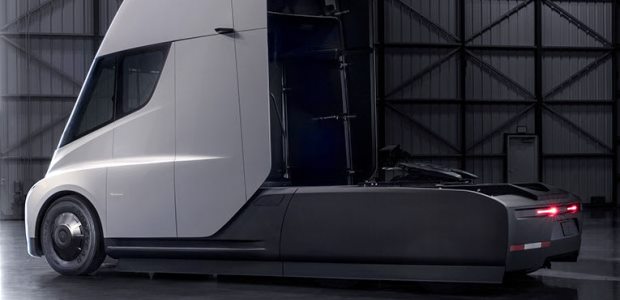
UPS Order Boosts Tesla Truck Prospects
Not only are the tractors expected to have a range of up to 500 miles on a single charge, but they also offer enhanced on-road safety and significantly reduced long-term cost of ownership, according to UPS, which said the tractors' safety features will include automatic emergency braking, adaptive cruise control, automated lane guidance, and brake-by-wire and steer-by-wire with redundancy.
UPS plans to be one of the first customers to operate Tesla's fully electric Semi tractors, following the UPS announcement last week that it has ordered 125 of them. Tesla plans to begin production in 2019, according to the UPS announcement, which said the new tractors will join UPS's "extensive alternative fuel and advanced technology vehicle fleet, comprised of trucks and tractors propelled by electricity, natural gas, propane and other non-traditional fuels."
"For more than a century, UPS has led the industry in testing and implementing new technologies for more efficient fleet operations. We look forward to expanding further our commitment to fleet excellence with Tesla," said Juan Perez, chief information and engineering officer. "These groundbreaking electric tractors are poised to usher in a new era in improved safety, reduced environmental impact, and reduced cost of ownership."
Not only are the tractors expected to have a range of up to 500 miles on a single charge, but they also offer enhanced on-road safety and significantly reduced long-term cost of ownership, according to UPS, which said the tractors' safety features will include automatic emergency braking, adaptive cruise control, automated lane guidance, and brake-by-wire and steer-by-wire with redundancy.
The announcement said UPS has given Tesla real-world UPS trucking lane information as part of UPS's evaluation of the vehicle's expected performance for the UPS duty cycle. The preorder of Tesla vehicles advances UPS's commitment to reduce its absolute greenhouse gas emissions from global ground operations 12 percent by 2025, the company said, adding that, by 2020, it plans that one in four new vehicles purchased annually will be an alternative fuel or advanced technology vehicle, up from 16 percent in 2016, and 40 percent of all ground fuel will be from sources other than conventional gasoline and diesel, an increase from 19.6 percent in 2016.
UPS operates more than 8,500 vehicles throughout the world. They include all-electric, hybrid electric, hydraulic hybrid, ethanol, compressed natural gas, liquefied natural gas, propane, and renewable natural gas/biomethane vehicles. The announcement said UPS also operates one of the world's safest commercial fleets, investing more than $194 million in global health and safety training in 2016 and continuing to install in-vehicle collision mitigation technology for its class 8 fleet.